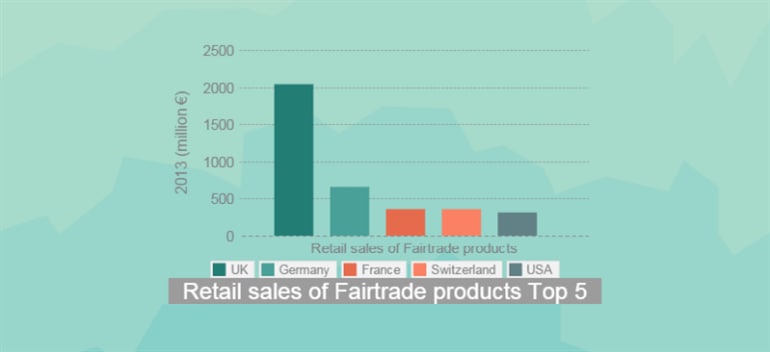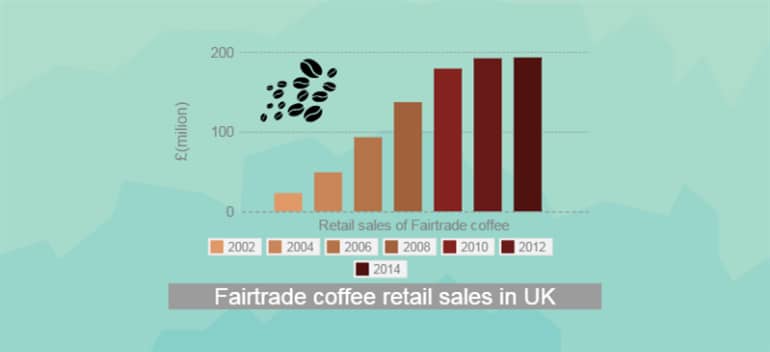Answer these simple questions and we will find you the BEST prices
Which type of solar quotes do you need?
It only takes 30 seconds
100% free with no obligation

Get up to 4 quotes from our selected suppliers by filling in only 1 form

Save money by comparing quotes and choosing the most competitive offer

Our service is 100% free and with no obligation
- Market-Inspector.co.uk
- Blog
- The Explosion Of Fairtrade Coffee Retail Sales in the UK
The Explosion of Fairtrade Coffee Retail Sales in the UK
The UK and the Global Coffee Market
After a deep research on the coffee industry, we at Market-inspector found that the global coffee market has gone through significant transformations in the last few decades, especially when it comes to fair trade. It might be unexpected to some, that the coffee market in the UK is one of the top change makers in the fairtrade coffee industry.
We all know that British people love to drink tea and talk about the weather. However, in the last decade coffee machines are used more and more, in order to satisfy the increasing demand for coffee in the UK. After all, the United Kingdom is the 9th largest coffee importer in the world.
Surprisingly or not, the UK coffee market holds nearly 3.3% of the world’s coffee import, which corresponds to nearly 185,000 tonnes. Even though the British people are not the biggest coffee consumers, the coffee market in the UK has a huge impact on the world’s coffee market.
If you run a business and are interested in purchasing a new coffee machine, we are here to help you. From coffee vending machines to espresso coffee machines, we can give you free, no-obligation quotes from our qualified suppliers. Fill out the contact form to get started!
The Global Coffee Market in Crisis
Since Vietnam became the second largest coffee producer during the 90’s, the coffee market has changed dramatically. As a result of the oversupply, the price of coffee dropped at its lowest levels. These processes led to extremely unpleasant consequences for small coffee producers. Coffee farmers from Africa, South America and Asia have been suffering since then.
Having in mind that 80% of the world’s coffee is produced by smallholders, fair trade became crucially important. It somehow served as a guarantee that producers will be provided with better deals for their work. And when it comes to retail sales of fairtrade products, the coffee market in the UK is an absolute leader.

The Rise of Fair Trade Coffee in the UK
The UK is one of the countries which played a major role in fair trading and in terms of the revival of the coffee market. For the last 12 years the retail sales of fairtrade coffee in the UK increased nearly 10 times, which is quite a lot for a country of tea drinkers. The number of coffee shops is rapidly growing, exceeding 16,000 in 2014. Furthermore, the second biggest player in the coffee shop business in the UK is one of the largest purchasers of fairtrade coffee products, as well as many of the independent coffee shops.
This is how the British consumers became one of the biggest supporters of the world fair trade coffee industry. Even more, according to Allegra Strategies, the number of coffee shops in the UK will reach 20,000 in 2018, promising more support for the fair trading.

Criticism
The fair trade has also been put under a lot of pressure. Some critics claimed that when a customer buys a cup of coffee, only a small percentage of the final price is actually going to the coffee producer. Other criticism is focused on the fact that fair trade certified products are mostly for the mass market. However, fair trade is constantly developing in order to respond the need for socially sustainable coffee production.
For example, product rating sites such as the GoodGuide allows consumers to assess sustainable practices of coffee production of particular brands. It also allows people to accrue information about global supply chains so you know the process of how your coffee beans end up in your mug.
While sites like this can also end up with imperfect or often opaque results, there are still merits. For instance, its product traceability is achieved based on product searches, so it can actually gather a large degree of information about a single product. This overrides the process of greenwashing by fair trade labels, which can only certify social and environmental practices at the initial point of purchase between the farmer and the importer. The GoodGuide can track policies and practices through different points of purchase and can capture the complexity of the entire global supply chain.
Towards “Better” Coffee: What Does this Actually Entail?
Higher coffee consumption in society also means that people demand high-quality organic coffee. It also means that producers and buyers have more direct network relationships, and it creates democratic governance. Organic certifications mean higher standards for farmers, which means carrying out the following tasks:
Hence, it is important that fair-trade practices ensure that coffee farmers are afforded negotiative power and fair prices. Fortunately, fair-trade coffee beans are attractive to companies because it ensures them access to multiyear contracts with more security against volatile markets. This is also guaranteed at a premium price. Interesting, what was initially a not for profit scheme, has suddenly included for-profit actors that sell labelled products.
This is a slippery slope because the very companies that label their coffee beans as organic and fair trade, and offer some degree of transparency, can be easily co-opted by the very market forces they seek to overcome. This brings about questions of whether coffee producers in the global South really have a place in decision-making processes. The fact that these processes are so complex, doesn’t make it easy for consumers to make the “right” choice, which is why institutionalizing technologies like GoodGuide are a significant first step to changing consumer behaviour.
Giving Hope to Small Coffee Producers
As previously mentioned, the UK is an absolute leader when it comes to fair trade retail sales. It is difficult to explain why coffee culture has become so popular among British people. However, there is no doubt that coffee shops are offering a wide range of high quality coffee drinks and Brits love them.
Furhermore, more and more coffee shops and cafés are using fairtrade coffee products. Somehow, UK coffee lovers are unconsciously giving hope to 25 million small coffee producers, who don’t have the support of their local governments and business sectors.
Many coffee producers are forced to work under unacceptable conditions, but still doing their best so that we can drink coffee of the highest quality.
Sources: Fairtrade Foundation, ICO, statista.com, stc-coffee.com
If you are interested in investing in an office coffee machine, then Market Inspector is here to help. Fill in the contact form and we'll be in touch with up to four quotes from suppliers in your area. This service we offer is completely free of charge and non-binding.
Fill in the form in just 1 minute
We strive to connect our customers with the right product and supplier. Would you like to be part of Market Inspector?

